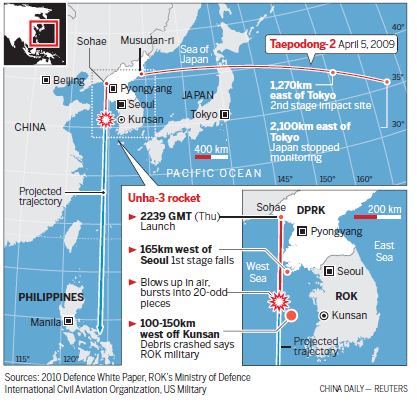
|
 |
KWANGMYONGSONG-1 Scientific experiment satellite Launched on Aug 31, 1998, by the Paektusan-1 carrier rocket from the Tonghae satellite launch facility at Musudan-ri, North Hamgyong province, in the Democratic People’s Republic of Korea. |
Reactions from the global community will by and large determine Pyongyang's next move, Ruan said, adding: "Overreaction may provoke the DPRK and corner it into further isolation."
The White House said Pyongyang's satellite launch, despite its failure, threatens regional security, violates international law and contravenes its own recent commitments.
Similarly, Japan's chief cabinet secretary, Osamu Fujimura, said the country has made a strict protest through diplomatic channels.
"Even if it was a failure, it is a grave provocation to our country," he said.
Worries had mounted that the DPRK may be using the opportunity to prepare for an atomic test, according to Wang Junsheng, an expert of Northeast Asian studies at the Chinese Academy of Social Sciences in Beijing.
Western critics see the launch as a ballistic missile test, which the DPRK has been banned from carrying out under UN Security Council Resolutions.
The United States, Japan and Republic of Korea will continue to use Pyongyang's satellite programs as an excuse to expand their anti-ballistic missile defense systems, said Ruan.
"Although the launch failed, these powers will still see the DPRK as an 'X factor' and try to deploy ABMs. This is something China doesn't want to see, because it will only militarize and spark conflict in the region," he said.
In any event, there had been a lot of hype over Pyongyang's actual launch capabilities, said Zhang Xiao'an, vice-president of the United Nations Association of China.
"China is concerned that DPRK-US relations, which had eased, may be dragged into a new vicious cycle and could even lead to an arms race," she said.
Contact the writers at the wujiao@chinadaily.com.cn and huyinan@chinadaily.com.cn
Zhao Shengnan contributed to this story in Beijing.